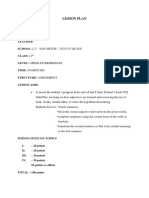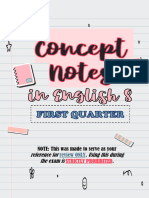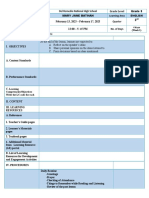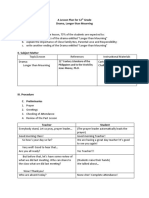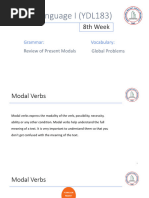100%(1)100% found this document useful (1 vote)
134 viewsInstructional Plan (iPLAN) For English 8: Exercise
Instructional Plan (iPLAN) For English 8: Exercise
Uploaded by
ruth varquezThis instructional plan outlines a lesson for grade 9 English students on expressing permission, obligation, and prohibition using modals. The lesson will define modals and their uses for permission, obligation, and prohibition. Students will work in groups to create dialogues demonstrating the different uses of modals and present them to the class.
Copyright:
© All Rights Reserved
Available Formats
Download as DOCX, PDF, TXT or read online from Scribd
Instructional Plan (iPLAN) For English 8: Exercise
Instructional Plan (iPLAN) For English 8: Exercise
Uploaded by
ruth varquez100%(1)100% found this document useful (1 vote)
134 views2 pagesThis instructional plan outlines a lesson for grade 9 English students on expressing permission, obligation, and prohibition using modals. The lesson will define modals and their uses for permission, obligation, and prohibition. Students will work in groups to create dialogues demonstrating the different uses of modals and present them to the class.
Original Title
IPLAN-MODALS
Copyright
© © All Rights Reserved
Available Formats
DOCX, PDF, TXT or read online from Scribd
Share this document
Did you find this document useful?
Is this content inappropriate?
This instructional plan outlines a lesson for grade 9 English students on expressing permission, obligation, and prohibition using modals. The lesson will define modals and their uses for permission, obligation, and prohibition. Students will work in groups to create dialogues demonstrating the different uses of modals and present them to the class.
Copyright:
© All Rights Reserved
Available Formats
Download as DOCX, PDF, TXT or read online from Scribd
Download as docx, pdf, or txt
100%(1)100% found this document useful (1 vote)
134 views2 pagesInstructional Plan (iPLAN) For English 8: Exercise
Instructional Plan (iPLAN) For English 8: Exercise
Uploaded by
ruth varquezThis instructional plan outlines a lesson for grade 9 English students on expressing permission, obligation, and prohibition using modals. The lesson will define modals and their uses for permission, obligation, and prohibition. Students will work in groups to create dialogues demonstrating the different uses of modals and present them to the class.
Copyright:
© All Rights Reserved
Available Formats
Download as DOCX, PDF, TXT or read online from Scribd
Download as docx, pdf, or txt
You are on page 1of 2
Instructional Plan (iPLAN) for English 8
Cooperating Teacher Mrs. Jeneth Minerales Grade Level 9
Student Teacher Ruth V. Huit Quarter 4th
Learning Expressing permission,obligation and prohibition
Competencies
iPlan no. EN9G-IV- Date February 6, 2018 Duration: 1 hr & 20 mins
23
Key Concepts Identifying Modals
Learning objectives Knowledge Identify what a modal is all about
Skills Express permission, obligation and prohibition through creating a dialogue
Attitude Offer examples of modals used in spoken language
Content/Topic Identify the different uses of modals
Learning Handouts and Visual aids
resources/Materials/
Equipments
Procedures
Activity Give the students sentences and ask them which of the sentences express permission,
obligation and promotion.
Ask the students to give some ideas what 'permission', ’obligation' and 'promotion'.
Analysis The teacher will have a discussion what MODALS are and its Categories.
Modals, modal verbs, modal auxiliary verbs, modal auxiliaries are helping verbs which are
used together with the other verbs to express permission, obligation and prohibition.
Uses of Modals
1. Permission-can, may, could
'Can' is most often used to ask for or give permission but 'may' and 'could' are also
possible even though they are not used as often as 'can'.
2. Prohibition
Can't' and 'mustn't' (must not) are used to show that something is prohibited (not
allowed)
'Can't' usually gives the idea of something that is against the rules. Mustn’t usually
means that it is the speaker who is setting the rule.
3. Obligation
'Have to' and 'must' are both used to express obligation. There is a slight difference in
the way that they are both used.
'Have to' shows that the obligation comes from someone else, not the speaker. This is
usually referring to a rule or law.
'Must' shows us that the obligation comes from the speaker.
The teacher will give further examples to the students.
Abstraction 1. What modals must be used in asking permission?
2. What modals must be used in illustrating obligation?
3. What modals must be used in demonstrating prohibition?
4. Can you cite an everyday situations where modals are being used?
5. Why do you think these are important?
Application Group the students into five. Ask them to create a dialogue where modals of permission,
obligation ang prohibition are being used.
The students will demonstrate their dialogue infront of the class.
Each group will only be given 2-3 minutes.
Assessment Exercise:
Exercises: Underline the appropriate modal auxillary verbs inside the parenthesis.
1. (Can, Will, Would) I come with you?
2. (Could, Will, Would) help me with the housework, please?
3. I (have to, must, should) stay on for a few hours because I’d rather work late today than
over the weekend.
4. I can’t get a connection on my phone. (can, may, could) I borrow yours?
5. We (must not, will not, cannot) make the first move.
6. We (can, have to, should) be there fifteen minutes before the concert starts.
7. (Will, Would, Can) you get a shawl from Kashmir?
8. (Will, Would, Should) you mind if I borrow your car?
9. (Will, Shall, Should) you take care of my dogfor a day?
10. The rules say that you (can, have to, should) only invite one guest to the club.
Assignment The teacher will remind the students to start their group project for the fourth grading.
You might also like
- Comma - ExercisesDocument3 pagesComma - ExercisesNataszaWalzNo ratings yet
- Aristotelian Appeals: Logos, Ethos, and PathosDocument2 pagesAristotelian Appeals: Logos, Ethos, and Pathosyolly grandi100% (1)
- Clauses and Complex Sentences-1Document9 pagesClauses and Complex Sentences-1Klein LibaoNo ratings yet
- Explicit and Implicit Claims in A TextDocument3 pagesExplicit and Implicit Claims in A Textruth varquez100% (4)
- Explicit and Implicit Claims in A TextDocument3 pagesExplicit and Implicit Claims in A Textruth varquez100% (4)
- Infinitive or - Ing FormDocument2 pagesInfinitive or - Ing FormXantal Garcia100% (5)
- Explanation Gerunds and InfinitivesDocument2 pagesExplanation Gerunds and InfinitivesMiriam La de FelipeNo ratings yet
- 16 CapitalizationDocument4 pages16 Capitalizationapi-262774252No ratings yet
- Modals of Permission, Obligation and ProhibitionsDocument1 pageModals of Permission, Obligation and ProhibitionsCharmaine Hernandez CastillejosNo ratings yet
- Excellent Achievers Learning, Center, IncDocument5 pagesExcellent Achievers Learning, Center, IncJoyR.Alota100% (1)
- Narrative & Accomplishment ReportDocument2 pagesNarrative & Accomplishment ReportJhayzen Villanueva100% (1)
- Excersice 38 HojasDocument38 pagesExcersice 38 HojasNoelia Syrena Kbayero100% (1)
- Summative TestDocument2 pagesSummative TestJunior Payatot100% (1)
- LESSON PLAN ConditionalsDocument7 pagesLESSON PLAN ConditionalsAnca GheorghitaNo ratings yet
- 1º Bachillerato Oxford Grammar ExercisesDocument10 pages1º Bachillerato Oxford Grammar ExercisesElenaArevalo0% (1)
- Modal VerbsDocument12 pagesModal VerbsAnka MariaNo ratings yet
- English 9 Quarter 3 Summative Assessment 1: III. 16-20. DirectionsDocument2 pagesEnglish 9 Quarter 3 Summative Assessment 1: III. 16-20. DirectionsMaicaNo ratings yet
- Speech Styles QuizDocument2 pagesSpeech Styles QuizIvyNo ratings yet
- English: The Language of PersuasionDocument10 pagesEnglish: The Language of Persuasionmargilyn ramosNo ratings yet
- Extra Language Practice: VocabularyDocument3 pagesExtra Language Practice: Vocabularyana maria csalinasNo ratings yet
- Active and Passive VoiceDocument3 pagesActive and Passive VoiceEddie Kim CañoNo ratings yet
- Communicative StrategiesDocument4 pagesCommunicative StrategiesEfraim Joey CorderoNo ratings yet
- CAPRISA Rules and GuidelinesDocument6 pagesCAPRISA Rules and Guidelineselinel barnuevoNo ratings yet
- How To Build A PositionDocument22 pagesHow To Build A PositionBhebz Erin MaeNo ratings yet
- Activities About ModalsDocument2 pagesActivities About ModalsGlaiza Carla Festin FanoNo ratings yet
- Functional Scoring Rubric PatDocument1 pageFunctional Scoring Rubric Patapi-278694488No ratings yet
- English 7 Test Paper q2Document5 pagesEnglish 7 Test Paper q2Richard BernardoNo ratings yet
- Reading and Writing: Performance Task-MidtermDocument2 pagesReading and Writing: Performance Task-MidtermChristian BlantucasNo ratings yet
- Lesson 5. Use Conditionals in Expressing Arguments.Document19 pagesLesson 5. Use Conditionals in Expressing Arguments.Ellie HatakeNo ratings yet
- GRADES 1 To 12 Daily Lesson Log Grade 9 English Week 2 Fourth Quarter I. Objectives Monday Tuesday Wednesday Thursday FridayDocument7 pagesGRADES 1 To 12 Daily Lesson Log Grade 9 English Week 2 Fourth Quarter I. Objectives Monday Tuesday Wednesday Thursday FridayVince Rayos CailingNo ratings yet
- Curriculum GuideDocument30 pagesCurriculum Guideapril joy aspiras50% (4)
- 3q - Summative Test Eng 10Document8 pages3q - Summative Test Eng 10Perry Amatorio Delos Reyes Jr.No ratings yet
- Argumentative Essay Grading RubricDocument2 pagesArgumentative Essay Grading Rubrickhulel buyunNo ratings yet
- Sheltered Instruction & Blended Learning UbDDocument2 pagesSheltered Instruction & Blended Learning UbDBret GosselinNo ratings yet
- Disaster Recovery Plan - LandslideDocument6 pagesDisaster Recovery Plan - LandslideLheane Marley LopenaNo ratings yet
- Guidelines For Oral Recitation PDFDocument1 pageGuidelines For Oral Recitation PDFSeeNo ratings yet
- Final Speechfest Guidelines PDFDocument38 pagesFinal Speechfest Guidelines PDFEladAquinoNo ratings yet
- Group Dynamics CHAPT 9Document9 pagesGroup Dynamics CHAPT 9Odaa BultumNo ratings yet
- Infinitives and GerundsDocument2 pagesInfinitives and GerundsSerene PalaceNo ratings yet
- Jesus Heals and ForgivesDocument18 pagesJesus Heals and ForgivesErrold SerranoNo ratings yet
- CLC Establishing A Professional Learning CommunityDocument19 pagesCLC Establishing A Professional Learning Communityapi-623626988No ratings yet
- Rubric Lit AnalysisDocument2 pagesRubric Lit Analysisapi-359849272No ratings yet
- Extra Language Practice: TravelDocument3 pagesExtra Language Practice: Travelana maria csalinasNo ratings yet
- Passive and Active VoiceDocument10 pagesPassive and Active VoiceAileen gay PayunanNo ratings yet
- Academic Contest 2021 Guidelines and ProcedureDocument6 pagesAcademic Contest 2021 Guidelines and ProcedureMikael Cabanalan FerrerNo ratings yet
- ENGLISH-8-Quarter 2-Week 1-2Document12 pagesENGLISH-8-Quarter 2-Week 1-2Duero-Hadjilatip KayeNo ratings yet
- English 10 Lesson Exemplar Week 1Document3 pagesEnglish 10 Lesson Exemplar Week 1Laarnie Bambe de LeonNo ratings yet
- Quiz On Citing SourcesDocument2 pagesQuiz On Citing SourcesTC F. SawiNo ratings yet
- The Nature of Arsenic Poisoning and Its Effects On Human HealthDocument5 pagesThe Nature of Arsenic Poisoning and Its Effects On Human HealthAlexandra LimNo ratings yet
- 2019 Filgr7q3Document122 pages2019 Filgr7q3Jenalyn TayamNo ratings yet
- Expressing Prohibition Using ModalsDocument3 pagesExpressing Prohibition Using ModalsJOHN CHRISTIAN TAPARANONo ratings yet
- ENG202 Ch11.PDF Delivering Your SpeechDocument28 pagesENG202 Ch11.PDF Delivering Your SpeechOmar SroujiNo ratings yet
- Transitional DevicesDocument13 pagesTransitional DevicesAlma Laxamana EspirituNo ratings yet
- Sentence CorrectionDocument10 pagesSentence CorrectionsanjivsingNo ratings yet
- English 8 Quarter 1 Concept Notes 1Document18 pagesEnglish 8 Quarter 1 Concept Notes 1Villegas Kate Andrea BNo ratings yet
- Grade 9 Mary Jane Bathan: 4 Days (Week 1)Document6 pagesGrade 9 Mary Jane Bathan: 4 Days (Week 1)Eunice MagturoNo ratings yet
- Declamation MechanicsDocument1 pageDeclamation MechanicsBrian Torres100% (1)
- G 9 English SUMMATIVE 4th QuarterDocument11 pagesG 9 English SUMMATIVE 4th QuarterLeza FurCasNo ratings yet
- Reviewer in English 9: Quarter 3Document7 pagesReviewer in English 9: Quarter 3Rania ManalundongNo ratings yet
- JANUARY NewspaperDocument16 pagesJANUARY NewspaperRandell AranzaNo ratings yet
- Small Group CommunicationDocument21 pagesSmall Group CommunicationThandeka KhwelaNo ratings yet
- Grade9 ShowMeYourModalsDocument11 pagesGrade9 ShowMeYourModalsRinalyn MendezNo ratings yet
- DLL Grade 9Document8 pagesDLL Grade 9kaylleapiladaNo ratings yet
- Assessment of Student Learning Debate RubricDocument1 pageAssessment of Student Learning Debate Rubricruth varquezNo ratings yet
- African Nobel Prize WinnersDocument3 pagesAfrican Nobel Prize Winnersruth varquezNo ratings yet
- List of Countries in AfricaDocument28 pagesList of Countries in Africaruth varquez100% (1)
- A Lesson Plan For 12th Grade DramaDocument5 pagesA Lesson Plan For 12th Grade Dramaruth varquez50% (2)
- The Dream of A.IDocument5 pagesThe Dream of A.Iruth varquezNo ratings yet
- A Lesson Plan For 12th Grade DramaDocument5 pagesA Lesson Plan For 12th Grade Dramaruth varquez50% (2)
- Speech RubricsDocument2 pagesSpeech Rubricsruth varquez100% (1)
- Quiz 1-Reading and WritingDocument1 pageQuiz 1-Reading and Writingruth varquezNo ratings yet
- Purposive Communication LabDocument1 pagePurposive Communication Labruth varquezNo ratings yet
- Modals, Modal Verbs, Modal Auxiliary Verbs, Modal Auxiliaries Are Helping Verbs Which Are Used TogetherDocument2 pagesModals, Modal Verbs, Modal Auxiliary Verbs, Modal Auxiliaries Are Helping Verbs Which Are Used Togetherruth varquezNo ratings yet
- Perfect ModalsDocument15 pagesPerfect ModalsJo Cru0% (1)
- Ways and Means of Expressing Modality inDocument48 pagesWays and Means of Expressing Modality inAna1598100% (1)
- First Vs Second ConditionalDocument7 pagesFirst Vs Second ConditionalAna Donoso0% (1)
- Joseph Bedier Tristan Si IzoldaDocument5 pagesJoseph Bedier Tristan Si Izoldagensai kNo ratings yet
- EnglishTown. GramáticaDocument134 pagesEnglishTown. GramáticaSantiago Díaz MontenegroNo ratings yet
- WLP English 8 Q1 W8Document3 pagesWLP English 8 Q1 W8Ryan Anoche BertuldesNo ratings yet
- Handout of English - Grade 9Document10 pagesHandout of English - Grade 9NarcisoNo ratings yet
- Pre-História Da Língua ÁrabeDocument13 pagesPre-História Da Língua ÁrabelivrosgaNo ratings yet
- English TestsDocument52 pagesEnglish TestsNenad Majki'No ratings yet
- Modal Verbs of PossibilityDocument6 pagesModal Verbs of PossibilityScott100% (1)
- Activities Guide and Evaluation Rubric - Unit 2 - Task 3 - Planning The TripDocument8 pagesActivities Guide and Evaluation Rubric - Unit 2 - Task 3 - Planning The TripTatiana PaolaNo ratings yet
- Auxulary VerbsDocument3 pagesAuxulary VerbsKazue AchmadNo ratings yet
- Auxiliary and Modal VerbsDocument12 pagesAuxiliary and Modal VerbsRISHI RAJNo ratings yet
- Modal Verbs: Modals of ObligationDocument13 pagesModal Verbs: Modals of ObligationLacassiapeiaNo ratings yet
- Modal Verbs Basics by Let's Crack CELPIP (+91-7027909999)Document3 pagesModal Verbs Basics by Let's Crack CELPIP (+91-7027909999)aj_anmolNo ratings yet
- Cultural Know HowDocument5 pagesCultural Know HowDaryaNo ratings yet
- Unit 1 Hortatory ExpositionDocument28 pagesUnit 1 Hortatory ExpositionQurrotAinyNo ratings yet
- Tbi Bab 18 Reading ComprehensiveDocument5 pagesTbi Bab 18 Reading ComprehensiveKarina Bunga100% (1)
- 1) Complete The Email With The Correct TenseDocument4 pages1) Complete The Email With The Correct Tenselpa_20No ratings yet
- Ingles Tecnico - Actividad EntregableDocument16 pagesIngles Tecnico - Actividad EntregableAngie MamaniNo ratings yet
- 1 Review of Present ModalsDocument23 pages1 Review of Present Modalsipekyilmaz9702No ratings yet
- Learning Module in Module Title: - (Continuation)Document4 pagesLearning Module in Module Title: - (Continuation)Jieza May MarquezNo ratings yet
- English10 Q2 Mod4 ArgumentativeTextsModalVerbsandModalAdverbsDocument31 pagesEnglish10 Q2 Mod4 ArgumentativeTextsModalVerbsandModalAdverbsJohnny JohnnyNo ratings yet
- PTE Academic Writing: Teacher ToolkitDocument28 pagesPTE Academic Writing: Teacher ToolkitHabin BasnetNo ratings yet
- AdvEng B2 M04 Teacher OverviewDocument2 pagesAdvEng B2 M04 Teacher OverviewGoCarrNo ratings yet
- Modals and Modal PerfectsDocument2 pagesModals and Modal PerfectsLaia FontNo ratings yet
- Assignment 1 Foundation VerbDocument23 pagesAssignment 1 Foundation VerbFaizal KadirNo ratings yet
- Modal VerbsDocument21 pagesModal VerbsIoana Margineanu100% (1)
- Mood in EnglishDocument9 pagesMood in EnglishАлина АйнулинаNo ratings yet












